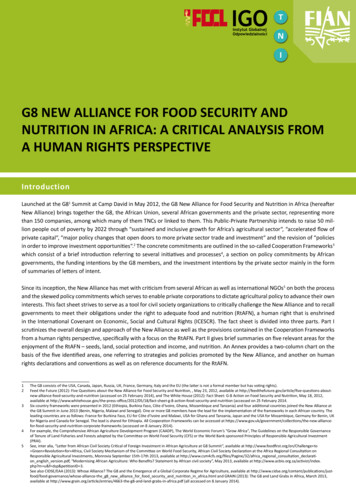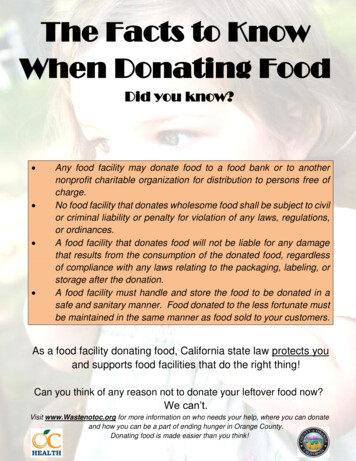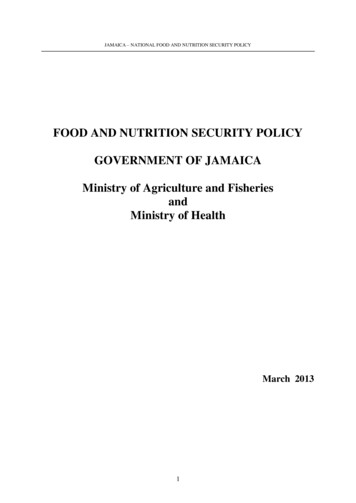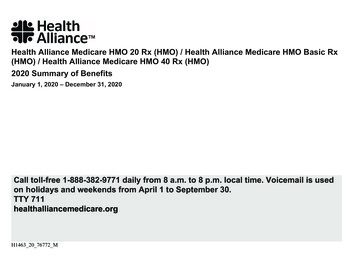
Transcription
G8 NEW ALLIANCE FOR FOOD SECURITY ANDNUTRITION IN AFRICA: A CRITICAL ANALYSIS FROMA HUMAN RIGHTS PERSPECTIVEIntroductionLaunched at the G81 Summit at Camp David in May 2012, the G8 New Alliance for Food Security and Nutrition in Africa (hereafterNew Alliance) brings together the G8, the African Union, several African governments and the private sector, representing morethan 150 companies, among which many of them TNCs or linked to them. This Public-Private Partnership intends to raise 50 million people out of poverty by 2022 through “sustained and inclusive growth for Africa’s agricultural sector“, “accelerated flow ofprivate capital“, “major policy changes that open doors to more private sector trade and investment“ and the revision of “policiesin order to improve investment opportunities“.2 The concrete commitments are outlined in the so-called Cooperation Frameworks3which consist of a brief introduction referring to several initiatives and processes4, a section on policy commitments by Africangovernments, the funding intentions by the G8 members, and the investment intentions by the private sector mainly in the formof summaries of letters of intent.Since its inception, the New Alliance has met with criticism from several African as well as international NGOs5 on both the processand the skewed policy commitments which serves to enable private corporations to dictate agricultural policy to advance their owninterests. This fact sheet strives to serve as a tool for civil society organizations to critically challenge the New Alliance and to recallgovernments to meet their obligations under the right to adequate food and nutrition (RtAFN), a human right that is enshrinedin the International Covenant on Economic, Social and Cultural Rights (ICESCR). The fact sheet is divided into three parts. Part Iscrutinizes the overall design and approach of the New Alliance as well as the provisions contained in the Cooperation Frameworksfrom a human rights perspective, specifically with a focus on the RtAFN. Part II gives brief summaries on five relevant areas for theenjoyment of the RtAFN – seeds, land, social protection and income, and nutrition. An Annex provides a two-column chart on thebasis of the five identified areas, one referring to strategies and policies promoted by the New Alliance, and another on humanrights declarations and conventions as well as on reference documents for the RtAFN.12345The G8 consists of the USA, Canada, Japan, Russia, UK, France, Germany, Italy and the EU (the latter is not a formal member but has voting rights).Feed the Future (2012): Five Questions about the New Alliance for Food Security and Nutrition, , May 23, 2012, available at outnew-alliance-food-security-and-nutrition (accessed on 25 February 2014), and The White House (2012): Fact Sheet: G-8 Action on Food Security and Nutrition, May 18, 2012,available at ion (accessed on 25 February 2014.Six country frameworks were presented in 2012 (Ethiopia, Burkina Faso, Côte d‘Ivoire, Ghana, Mozambique and Tanzania) and four additional countries joined the New Alliance atthe G8 Summit in June 2013 (Benin, Nigeria, Malawi and Senegal). One or more G8 members have the lead for the implementation of the frameworks in each African country. Theleading countries are as follows: France for Burkina Faso, EU for Côte d’Ivoire and Malawi, USA for Ghana and Tanzania, Japan and the USA for Mozambique, Germany for Benin, UKfor Nigeria and Canada for Senegal. The lead is shared for Ethiopia. All Cooperation Frameworks can be accessed at frameworks (accessed on 8 January 2014).For example, the Comprehensive African Agriculture Development Program (CAADP), The World Economic Forum’s “Grow Africa”, The Guidelines on the Responsible Governanceof Tenure of Land Fisheries and Forests adopted by the Committee on World Food Security (CFS) or the World Bank sponsored Principles of Responsible Agricultural Investment(PRAI).See, inter alia, “Letter from African Civil Society Critical of Foreign Investment in African Agriculture at G8 Summit”, available at http://www.foodfirst.org/en/Challenge to Green Revolution for Africa, Civil Society Mechanism of the Committee on World Food Security, African Civil Society Declaration at the Africa Regional Consultation onResponsible Agricultural Investments, Monrovia September 15th-17th 2013, available at http://www.csm4cfs.org/files/Pagine/32/africa regional consultation declaration english version.pdf, “Modernising African Agriculture: Who Benefits? Statement by African civil society”, May 2013, available at http://www.acbio.org.za/activist/index.php?m u&f dsp&petitionID 3.See also CIDSE/EAA (2013): Whose Alliance? The G8 and the Emergence of a Global Corporate Regime for Agriculture, available at /food-governance/whose-alliance-the g8 new alliance for food security and nutrition in africa.html and GRAIN (2013): The G8 and Land Grabs in Africa, March 2013,available at nd-land-grabs-in-africa.pdf (all accessed on 8 January 2014).
G8 NEW ALLIANCE FOR FOOD SECURITY AND NUTRITION IN AFRICA2Part I – General Human Rights Analysis of the New Alliance1.General human rights principles are ignored.1.1. Non-participation of the stakeholders mostly affected by hunger and nutrition in the strategy elaboration –both at international and local level.Small-scale farmers, pastoralists, fisher-folk, indigenous people, women, and other marginalised groups who are mostly affectedby hunger and malnutrition were excluded from the elaboration of Cooperation Frameworks at international level, nor were thenegotiation processes between concerned governments and private corporations open to public scrutiny, while the participation ofthe above-mentioned affected groups at national level was either insufficient or not provided at all. National level investor forumswere held to draft the Cooperation Frameworks6 and participation was focussed strongly on the private sector.7 Commitment toguarantee effective participation of the marginalised groups is likewise lacking.Not only does this disregard the human rights principle of participation8, it also ignores G8’s own development policies9 which layspecial focus on small-scale food producers and small-holders as well as the Voluntary Guidelines on the Responsible Governanceof Tenure of Land, Fisheries and Forests10 (hereafter Tenure Guidelines), which are supported by the governments concerned inthe New Alliance.1.2. Marginalised groups are not at the centre of the strategies, but national and, in particular, international corporations.The Cooperation Frameworks and the measures/policies to be implemented almost exclusively deal with the interests and “needs”of international and large national companies who are the key partners of the New Alliance. This is clearly reflected in the policyindicators (“Doing Business Index” and increase in private investment) of the Cooperation Frameworks.11 Concrete policy commitments also focus on specific areas (corridors) where agroindustrial development is planned.12 Due to its emphasis on industrialagriculture and building of infrastructure in attracting investment, focusing on the corridors will continue to ignore the marginalisedgroups who are in fact actively discriminated against, instead of helping them to practice agriculture for local food security.The human rights-based framework, in contrast, demands positive discrimination (“preferential treatment”) of poor rural populationgroups in order to counteract existing discrimination faced by such groups.1.3. Lack of RtAFN accountabilityThe dominant role of the private actors raises the question of accountability. Private sector actors are primarily – if not exclusively –accountable to their shareholders, whose primary aim is to generate profits. So, who will be accountable for the actions of theprivate sector within the New Alliance? Reference to “Shared Responsibilities and Mutual Accountability” of all actors is made, butthis remains undefined and further obscures a concrete attribution of accountability. In sum there is a total lack of human rightsaccountability mechanisms in the New Alliance. G8 countries, as well as African countries thus should adopt human rights basedaccountability mechanisms that are accessible to all.6789101112CISDE/EAA, 6.See for example Malawi Cooperation Framework: „The Government commits to consulting with the private sector on key policy decisions that may affect the private sector”.The private sector role and its supposed legitimacy in key policy processes is also highlighted: “the private sector will assume active role in the Technical Working Groups, SectorWorking Groups and Joint Sector Reviews in ASWAp and TIP SWAp.”The human rights principle of participation has been stressed by the UN. See for example, “Participation and inclusion: All people have the right to participate in and access information relating to the decision-making processes that affect their lives and well-being. Rights-based approaches require a high degree of participation by communities, civil society,minorities, women, young people, indigenous peoples and other identified groups.”, UNFPA, the United Nations Population Fund, d on February 1, 2014). Special Rapporteur on the Right to Food likewise emphasises the importance of participation: “Participation of food-insecure groups in the policiesthat affect them should become a crucial element of all food security policies - from policy design, to the assessment of results, to decisions on research priorities. Improving thesituation of millions of food-insecure peasants indeed cannot be done without them.” See De Schutter, Olivier, “Agroecology, A Tool for the Realization of the Right to Food”, Rightto Food Quaterly 6 (2011), 4.All G8 members include some kind of support to smallholders and small-scale food producers in their development cooperation.See Tenure Guidelines 3B 6. and 4.10.Cooperation Frameworks of Côte d‘Ivoire, Ethiopia, Ghana, Malawi, Niger, and Tanzania have doing business index and Benin, Ethiopia, Ghana, Ivory Coast, Malawi, Mozambique(as part of objective), Nigeria, Senegal, and Tanzania for increased private investment.For example, Malawi Cooperation Framework (objective 2, policy 9) “Explicitly set Nacala Corridor as top priority corridor for development and include the connection to Lusaka”.
32.G8 NEW ALLIANCE FOR FOOD SECURITY AND NUTRITION IN AFRICAStates’ obligations are ignored. States as duty bearers are merely perceived as service provider of theprivate sector.i.The great majority of the States involved in the New Alliance are state parties to the ICESCR.13 As a state party, the state mustrespect, protect, and fulfil the RtAFN. The obligation to respect requires the State to not take any measures that result in preventing access to adequate food and nutrition. The obligation to protect requires measures by the State to ensure that enterprises orindividuals do not deprive individuals of their access to adequate food and nurition. The obligation to fulfill (facilitate) means theState must pro-actively engage in activities intended to strengthen people‘s access to and utilization of resources and means toensure their livelihood, including food security. Finally, whenever an individual or group is unable, for reasons beyond their control,to enjoy the RtAFN by the means at their disposal, States have the obligation to fulfill (provide) that right directly.ii. The New Alliance does not mention state obligations nor responsibilities of any third actors (such as private corporations).Worse still, the states are understood as service providers whose tasks are to reduce “risks and insecurities” of investors.14iii. Activities of private business can have a highly negative impact on the enjoyment of human rights15 and of the RtAFN due totheir involvement in food production, procession, distribution and trade. States thus are obliged under international law to ensurethat the activities of private corporations do not violate the RtFAN of any individuals.16 Specific concerns and potential conflicts ofinterests between profit maximisation and combating hunger, abuse of market power, dominance in price formation, land grabbing, poor working conditions, application of agro-industrial toxins, and influencing of policy processes remain untouched in theCooperation Frameworks. On the contrary, target countries commit to “build domestic and international private sector confidenceto increase agricultural investment significantly.”17 Accordingly, no regulatory approaches for human rights breaches by companieshave been considered nor elaborated upon.iv. The states’ obligation to fulfill under the RtAFN requires the creation of favourable framework conditions for groups at risk of,or affected by hunger. Instead of the one-sided facilitation of investments in land and seeds by national and international companies,access to natural resources as well as seed conservation and distribution systems of marginalised groups should be promoted.v. Extraterritorial State Obligations (ETOs) refer to obligations of the states to ensure that their policies do not contribute to violations of human rights, including the RtAFN, in other countries. The states must furthermore ensure that non-state actors whichthey are in a position to regulate (for example transnational corporations and businesses enterprises) do not nullify or impair theenjoyment of human rights, including the RtAFN.18 In the context of the New Alliance, this concerns the majority of the internationalcompanies that have signed a “letter of intent” since many have their headquarters in one of the G8 countries and could thereforebe directly regulated.193.No human rights risk analysis of the New Alliance strategiesPrior to developing New Alliance strategies, a human rights risk impact analysis should have been carried out to evaluate andcounteract potential risks, in particular, for marginalised groups. This is especially relevant as the policy areas targeted by the NewAlliance are extremely crucial for the RtAFN, namely, seeds, land, nutrition and governance in agriculture, upon which most hungryand malnourished people in the countries concerned depend. Thus, human rights impact assessments must be conducted prior to13141516171819Exceptions are Mozambique and the United States of America. While the US has signed the Covenant, Mozambique has neither signed nor ratified the Covenant.See, for example, The Cooperation Framework for Malawi, p. 3.See for example Economic and Social Council, Committee on Economic, Social and Cultural Rights. “Statement on the obligations of States parties regarding the corporate sectorand economic, social and cultural rights, 20 May 2011, E/C.12/2011/1, available at: C.12.2011.1-ENG.doc (accessed on 24February 2014).Furthermore, according to the Tenure Guidelines (3.2), “Where transnational corporations are involved, their home States have roles to play in assisting both those corporationsand host States to ensure that businesses are not involved in abuse of human rights and legitimate tenure rights. States should take additional steps to protect against abuses ofhuman rights and legitimate tenure rights by business enterprises that are owned or controlled by the State, or that receive substantial support and service from State agencies”, aswell as (paragraph 12. 15) “When States invest or promote investments abroad, they should ensure that their conduct is consistent with the protection of legitimate tenure rights,the promotion of food security and their existing obligations under national and international law, and with due regard to voluntary commitments under applicable regional andinternational instruments”. Similarly, the Maastricht Principles stresses the fact that (principle 24) Obligation to Regulate. All States must take necessary measures to ensure thatnon-State actors which they are in a position to regulate, as set out in principle 25, such as private individuals and organisations, and transnational corporations and other businessenterprises, do not nullify or impair the enjoyment of economic, social and cultural rights. These include administrative, legislative, investigative, adjudicatory and other measures.All other States have a duty to refrain from nullifying or impairing the discharge of this obligation to protect.This standard sentence appears in all the Cooperation Frameworks except the Senegalese Cooperation Framework, which states “This will build confidence by establishing a securebusiness environment that will motivate both the national and international private sectors to increase agricultural investment significantly.”See Maastricht Principles on Extraterritorial Obligations of States in the area of Economic, Social and Cultural Rights (2011); Principle 24.Some of these international companies are, for example, Monsanto (USA), DuPont (USA), Kraft Foods (USA), BASF (Germany), Bayer (Germany), ADM (USA), Cargill (USA) andBunge (Bermuda/ USA).
G8 NEW ALLIANCE FOR FOOD SECURITY AND NUTRITION IN AFRICA4inclusion of any strategy into policy commitments and the outcome of risk assessment should be made available to the public.20 Incase an assessment indicates that a specific policy may impair the enjoyment of human rights, the policy must be stopped. Such ahuman rights impact/risk assessment is missing in the New Alliance.4.Food security and nutrition is dangerously narrowed down to general availability of food throughincreased productivity.i.The four basic elements of the RtAFN are adequacy, availability, accessibility, and sustainability. The RtAFN thus goes beyondsimple understanding of producing enough food. Availability of food refers to two aspects. First, the direct disposal over productiveland or natural resources either by means of cultivation or animal husbandry, or activities such as fishing, hunting or gathering.Second, the availability via “well-functioning distribution, processing and market systems that can move food from the site of production to where it is needed in accordance with demand.”21ii. In particular, the direct availability of food via access to productive land and other natural resources is of central importancefor marginalised population in the concerned African countries, for the mere fact that far more than half of their populations areengaged in agriculture – in some countries even close to, or beyond 80 percent.22 The New Alliance, not only completely ignoresthe aspect of direct availability through access to natural resources, but promotes the unilateral control of companies and corporations over these resources. Therefore, there is a real risk that marginalised rural groups will lose control over these vital meansof production.iii. The New Alliance is built on the assumption that more production and growth through corporate investment will solve theproblem of hunger and malnutrition in Africa. However, in case of an actual increase of food production, there are no mechanismsto ensure that such increase would benefit the hungry and malnourished. The past has shown that investors predominantly producefor lucrative markets, thus implying that food will likely be exported and that the “additionally produced food” could even have anegative impact on the local food situation, if it results in the displacement of local food cultivation.iv. Apart from exporting, national or transnational agribusiness investors tend to focus on consumers with big purses, on feedingthe growing urban middle class, but not the rural poor. Thus from a human rights perspective, such a strong focus on quantitativerise in food production must be seen with caution. As opposed to the mere quantity of food, the RtAFN emphasises food availability“where it is needed.”23 These concerns are underpinned by concrete policy recommendations, e.g. “The GBI [Green Belt Initiative]and other donor funded irrigation projects will strongly be linked to the National Export Strategy.”24v. Furthermore, guaranteeing the protection and promotion of the nutritional dimension of the RtAFN requires measures beyondensuring access to adequate diversified diet and to basic public services (health, water and sanitation, care, social security, amongothers) in order to guarantee the effective enjoyment of nutritional well-being. In the Cooperation Frameworks, marginal attentionis paid to nutrition and related policies, nor does it deal in the required comprehensive way. Nutrition and food adequacy indicatorsare absent in the Cooperation Frameworks.In sum, the analysis above reveals that the New Alliance ignores human rights and contradicts a development strategy and policywhich contribute to the realization of the RtAFN.2021222324See Maastricht Principles on Extraterritorial Obligations of States in the area of Economic, Social and Cultural Rights (2011); Principle 14. Impact assessment and prevention:“States must conduct prior assessment, with public participation, of the risks and potential extraterritorial impacts of their laws, policies and practices on the enjoyment of economic, social and cultural rights. The results of the assessment must be made public. The assessment must also be undertaken to inform the measures that States must adopt toprevent violations or ensure their cessation as well as to ensure effective remedies.”UN Committee on Economic, Social and Cultural Rights (CESCR), General Comment No. 12: The Right to Adequate Food (Art. 11 of the Covenant), 12 May 1999, available at: 58025677f003b73b9 (accessed on 24 February 2014).Cf. FAOStat (2012) Resources/Country Profiles/Population; Benin (56,55 %), Burkina Faso (71,72%), Côte d’Ivoire (47,2%), Ethiopia (82,74), Ghana (46,37%), Malawi ( 78,63%),Mozambique (59,2%). Nigeria (48,05%), Senegal (56,62% ), Tanzania (72,15%), available at: http://faostat.fao.org/site/291/default.aspx (accessed on 18 December, 2013)General Comment 12, para 12.See Malawi Cooperation Framework.
5G8 NEW ALLIANCE FOR FOOD SECURITY AND NUTRITION IN AFRICAPart II – Analysis of the Key Policy Areas of the New Alliancefrom a Human Rights PerspectiveThe following brief summaries are based on the Cooperation Frameworks which focus on five thematic areas that are highly sensitiveand relevant for the RtAFN. The summaries below are an attempt to outline key problematic policies/strategies and indicators ofthe New Alliance, clearly highlighting some diametric opposition of the strategies in the Cooperation Frameworks vis-à-vis humanrights-based approach to development.251.Seeds and agricultural inputsOverall, the Cooperation Frameworks are heavily biased towards a market-led, if not a market-only, approach to agricultural inputs,especially seeds. Concretely, African governments commit to systematically cease the distribution of free and unimproved seeds,in order to create an environment that would enable the private sector to better commercialize improved inputs, to develop andimplement domestic and regional policies on seeds and other inputs that encourage greater private sector participation in production, marketing and trade in seeds and other inputs, and to pass and implement laws that “reflect” the role of the private sector intechnology development, seed multiplication and marketing. Accordingly, the success indicators of the Cooperation Frameworksonly look at whether private investment in commercial production and sale of seeds and inputs (e.g. fertilizer) has increased.26The secure and equitable access to natural and other resources that communities and individuals depend on to feed themselves isone of the basic contents of the RtAFN. The human rights obligations of states therefore require that they do not impede access tothese resources by small-scale producers (for seeds, this access often happens through informal, non-commercial seed systems),that they protect the access to seeds and inputs from interference by third parties such as enterprises or other institutions, andthat they take active measures to improve and facilitate access to natural resources for marginalized groups and those who dependon them for their livelihoods. However, none of the frameworks include provisions to protect peasants’ access and control overseeds and other inputs, nor their traditional knowledge over these. Instead, the provisions clearly aim at consolidating and advancecorporate influence and control over agricultural inputs, especially seeds.The heavy bias towards capital intensive agriculture based on commercial seeds and inputs further discriminates existing localseed systems that are a key source of access to seeds for rural communities, especially for poor peasants. Currently, 80 percent ofthe breeding or reproduction of seeds is conducted by the producers, and the free exchange of seeds plays an essential role forthem.27 There is a real risk that rural poor and marginalized will gradually lose existing access to seeds and become increasinglydependent on expensive inputs. This specifically discriminates women, as today they are the key actors in local seed systems. Inaddition, history has shown that private sector-led seed markets heavily reduce agrobiodiversity which is a key for a long termresilience of local to global food systems. Reduced agrobiodiversity also reduces nutritional diversity of food. The New Alliance islikely to further acerbate oligopolistic structures of the input providers market, which entails the serious risk of poor farmers beingdeprived of access to seeds and other productive resources essential for their livelihoods and which could easily lead to increasingthe price of food, thus making food less affordable for the poorest.The approach of the New Alliance thus further discriminates the large majority of small food producers who have a key role for ensuring local and national food security, and thus undermines the realization of the right to adequate food and nutrition. Despite overallintention of the New Alliance to be a sector strategy, there is a total absence of key issues such as local knowledge, participatoryresearch, traditional seed conservation systems, soil fertility enhancing measures or gender sensitivity. All these are highly relevantelements that need to be linked to seed and agricultural input policies with that aim at poverty reduction and resilient food systems.252627For a more detailed comparison of the G8NA cooperation frameworks with human rights texts and documents, refer to the table in the annex.For example, in the Cooperation Frameworks of Burkina Faso, of Ethiopia, Ghana, Malawi, (Mozambique – does not appear in key policy indicators but in actions), Nigeria, andTanzania.German NGO Forum on Environment and Development (2013): The New Alliance for Food Security and Nutrition in Africa: Is the Initiative by the G8 Countries suitable forCombating Poverty?, 3.
G8 NEW ALLIANCE FOR FOOD SECURITY AND NUTRITION IN AFRICA2.6LandLand figures prominently in the Cooperation Frameworks. All the Cooperation Frameworks contain a set of policy measures on landdesigned to help companies and other private or institutional investors to identify, negotiate for and acquire lands in key agricultural areas of the continent. African governments commit, for instance, to identify land suitable for investors, simplify proceduresfor investors to acquire lands, formalize land rights or measures to revise land laws, procedures and regulations in order to ensurequicker processing of land acquisitions. The Cooperation Frameworks also contain several measures aimed at increasing the protection of commercial farms and creating an investor-friendly environment, where the investments – and not local communities – areprotected and risks for investors are reduced.The policy measures on land as contained in the Cooperation Frameworks are diametrically opposed to those that arise from states’human rights obligations. States are obliged to not destroy existing access to land, to protect access to land from encroachment orany other kind of violation of this right by third parties such as enterprises or other institutions and individuals, and to take activemeasures to improve and facilitate access to land and related resources for marginalized groups and those who depend on themfor their livelihoods. However, none of the Cooperation Frameworks include commitments or provisions to protect peasant, fishers,forest dweller or pastoralist communities from losing their land to investors. In addition, no human rights impact assessments (exante and ex post) are included.Overall, the objectives and policy commitments are heavily biased towards large scale capital intensive agriculture, in many casesfocussing on export production. This is underpinned by success indicators that look only at whether private investment in agricultural production has increased or if the target country’s score on the World Bank’s Doing Business Index has been improved. TheCooperation Frameworks further remain silent on the centrality of social and cultural aspects of land in Africa as highlighted in theAfrican Union’s Framework and Guidelines on Land Policy in Africa. The New Alliance’s approach thus bears substantial risks thatabuses and violations of the RtAFN of small-scale food producers and other marginalized groups will increase – despite the NewAlliance’s food security rhetoric.3.Social protection and incomeSocial protection is a system which provides benefits either in cash or in kind,
G8 NEW ALLIANCE FOR FOOD SECURITY AND NUTRITION IN AFRICA: A CRITICAL ANALYSIS FROM A HUMAN RIGHTS PERSPECTIVE Introduction Launched at the G81 Summit at Camp David in May 2012, the G8 New Alliance for Food Security and Nutrition in Africa (hereafter New Alliance) brings together the G8, the African Union, several African governments and the private sector, representing more










